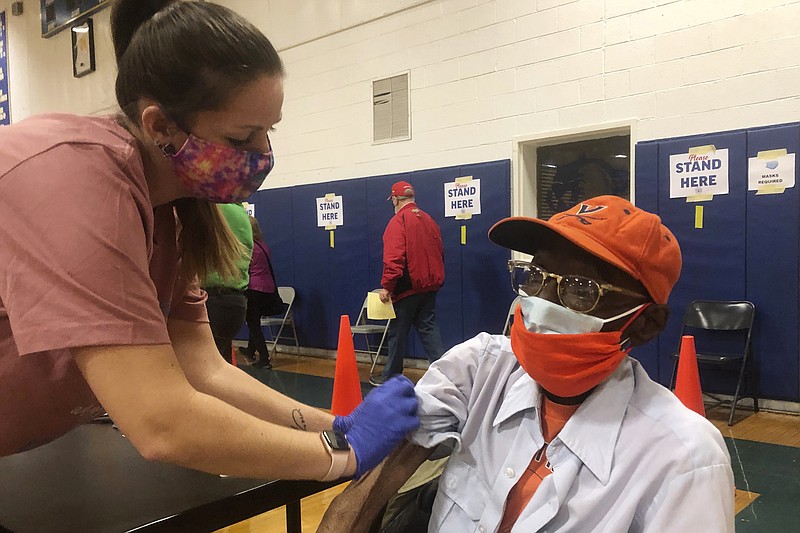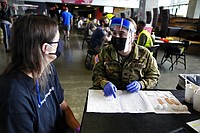WASHINGTON -- President Joe Biden, in his first formal news conference, Thursday doubled his original goal for covid-19 vaccinations by pledging that the nation will administer 200 million doses by the end of his first 100 days in office.
The nation met Biden's initial goal of 100 million doses earlier this month as the president pushes to defeat a pandemic that has killed more than 545,000 Americans and devastated the nation's economy.
"I know it's ambitious -- twice our original goal -- but no other country in the world has even come close, not even close, to what we're doing," Biden said as part of introductory remarks at the news conference. "I believe we can do it."
Biden's vaccinations goal amounts to a continuation of the pace of inoculations through the end of next month. The U.S. is now averaging about 2.5 million doses per day, and an even greater rate is possible. Over the next month, two of the bottlenecks to getting Americans vaccinated are set to ease as the U.S. supply of vaccines is on track to increase and states lift eligibility requirements to getting the shots.
[CORONAVIRUS: Click here for our complete coverage » arkansasonline.com/coronavirus]
Peter Hotez, co-director of the Texas Children's Center for Vaccine Development and a professor of pediatrics and molecular virology and microbiology at Baylor College of Medicine, said 200 million shots in 100 days is "not enough."
To halt transmission, Hotez said, about 80% of the population has to be immunized, meaning that about 260 million people need to get vaccinated. That would require 3 million to 3.5 million shots being administered each day until April 30.
Because two of the authorized vaccines are two-dose regimens, administering 200 million shots means fully vaccinating a far fewer number of people -- certainly not enough to reach the high levels of immunity needed to arrest spread of the virus.
Biden last week alluded to the new goal, telling reporters as he left the White House for Atlanta, "we may be able to double it." Promising 100 million shots in his first 100 days seemed risky when Biden outlined his plans in December, before distribution of the vaccines had begun. But it became clear by the inauguration that shots were already moving much faster into arms, prompting calls for Biden to up the ante.
[Video not showing up above? Click here to watch » https://www.youtube.com/watch?v=tkkx9jkWlLM]
Meanwhile, the Biden administration is committing nearly $10 billion to address inequities in vaccine coverage based on race, income and geography.
Deploying funding largely from the pandemic aid plan that cleared Congress this month, the administration will invest more than $6 billion in community health centers and make front-line essential workers and all people 16 and older with high-risk medical conditions eligible for vaccination. More than 65% of doses allocated by the federal government to community health centers have gone to members of minority groups, the administration said in a fact sheet announcing the plans.
Additional resources, the government promised, "will expand access to vaccines for vulnerable populations and increase vaccine confidence across the country."
With supply of all three authorized vaccines ramping up, issues of access and trust have become paramount. The administration has made equity a central priority, but the challenges are immense, beginning with a lack of clear data on the race and ethnicity of vaccine recipients.
Health and Human Services Secretary Xavier Becerra said in an interview this week that the government would need to go to great lengths to reach some people, such as those who toil in farm fields or at construction sites. Last week, the Centers for Disease Control and Prevention carved out a new position focusing on vaccine equity, naming a prominent HIV/AIDS doctor to the post.
As the immunization campaign picks up speed, racial gaps and other disparities are threatening to undermine progress in curtailing the pandemic.
A recent Kaiser Family Foundation analysis found a "consistent pattern across states of Black and Hispanic people receiving smaller shares of vaccinations compared to their shares of cases and deaths and compared to their shares of the total population." The pattern held from California, where Hispanics are 40% of the population but account for 21% of vaccinations, to the District of Columbia, where Black people make up 46% of the population but account for 31% of vaccinations.
The $6 billion will be disbursed by the Health Resources and Services Administration to nearly 1,400 community health centers throughout the country. While seeking to broaden access in minority communities and among rural and low-income populations, the funding outlined Thursday will also help promote uptake of vaccines. States and other jurisdictions will gain access to $3 billion for efforts aimed at boosting vaccine confidence in communities hit hardest by the pandemic.
Additional resources will support community health workers, according to the fact sheet.
As part of the package of initiatives aimed at vaccine equity, the administration also said it would begin distributing vaccine doses directly to dialysis treatment centers to reach the roughly 500,000 people in the United States receiving treatment for kidney disease, which disproportionately affects racial and ethnic minority groups.
ASTRAZENECA SHOTS
Separately, AstraZeneca insisted that its covid-19 vaccine provides strong protection even after counting additional illnesses in its U.S. study, as the drugmaker responded to concerns raised by American officials in an unusual public rebuke that threatened to further erode confidence in the vaccine.
[Gallery not loading above? Click here for more photos » arkansasonline.com/326covid19/]
In a late-night news release Wednesday, AstraZeneca said it had analyzed more data from that study and concluded that the vaccine is 76% effective in preventing symptomatic covid-19, instead of the 79% it had reported earlier in the week.
Some experts called the new analysis reassuring and said the updated details didn't look substantially different from what was announced earlier. A peek at the full data won't come for at least another few weeks, once the Food and Drug Administration begins its own stringent review. For now, it's not clear if the new figures will be sufficient to repair the credibility in a vaccine that, despite being widely used in Britain, Europe and other countries, has had a troubled rollout.
Earlier this week, an independent panel that oversees the U.S. trial of the vaccine accused AstraZeneca of cherry-picking data to tout the protection offered by its vaccine. The panel, in a letter to the company and to U.S. health leaders, said AstraZeneca had left out some covid-19 cases that occurred in the study.
The drugmaker responded that the results it reported included cases up to mid-February, as agreed in the study rules, and that it was preparing a fuller analysis of cases that had occurred since then -- which it released Wednesday.
"AstraZeneca may have just been too hasty in submitting the earlier, incomplete interim analysis rather than waiting to analyze and submit the full data set," said Julian Tang, a virologist at the University of Leicester who was not connected to the research. He said the updated details were likely solid enough for U.S. regulators to authorize the vaccine.
The updated information "confirms that our covid-19 vaccine is highly effective in adults, including those aged 65 years and over," AstraZeneca research chief Mene Pangalos said in a statement. He said the company looks forward to "the rollout of millions of doses across America."
Before the new results were released, Dr. Anthony Fauci, the top U.S. infectious-disease expert, told reporters that he hoped that when all of the data was publicly vetted by the Food and Drug Administration, it would dispel any hesitancy caused by the spat. He predicted it would "turn out to be a good vaccine."
AstraZeneca had been counting on findings from a predominantly U.S. study of 32,000 people to help rebuild confidence in its vaccine, which is crucial to global efforts to end the coronavirus pandemic since it is cheap, easy to store and a pillar of the Covax initiative aimed at getting vaccines to low- and middle-income countries. Despite evidence from trials and in real-world use that it does protect, previous studies have turned up inconsistent data about the degree of effectiveness.
Then last week a scare over blood clots had some countries temporarily pausing inoculations of the vaccine. Most have since restarted after the European Medicines Agency said the vaccine doesn't increase the overall incidence of blood clots, though it did not rule out a connection to some rare clots.
Danish officials decided Thursday to prolong their suspension of the AstraZeneca vaccine by three weeks while they continue evaluating the potential link with blood clots.
Denmark's decision "was made on the basis of presumed side effects," Tanja Erichsen, acting director of pharmacovigilance at the Danish Medicines Agency, said during a news conference.
"It can't be ruled out that there is a connection between the vaccine and the very rare blood clot cases," she said.
Denmark paused the use of the AstraZeneca vaccine as a precautionary measure on March 11 after reports that a 60-year-old woman died with blood clots in several parts of her body a week after she received the vaccine, according to health officials.
The death of a second person in Denmark who died after getting the AstraZeneca vaccine was reported. Danish health authorities said they have no evidence that the vaccine was responsible for either death.
"I would like to emphasize that I am not talking about ordinary blood clots," Erichsen said. "It is not about blood clots in the arms, legs and lungs."
The pause will last at least until April 18.
Information for this article was contributed by Jonathan Lemire, Zeke Miller, Lauran Neergaard, Maria Cheng, Jari Tanner and Jan M. Olsen of The Associated Press; and by Isaac Stanley-Becker and Lena H. Sun of The Washington Post.







